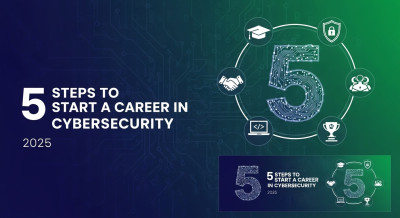
Precious Azuonwu
 cybersecurity career 2025, learn cybersecurity
cybersecurity career 2025, learn cybersecurity
 0 comment
0 comment
 09 Oct, 2025
09 Oct, 2025

In today’s digital world, cybersecurity has become one of the most in-demand and rewarding tech careers. As businesses, governments, and individuals rely more on technology, the need to protect sensitive data from hackers and cyberattacks has skyrocketed. If you’re wondering how to start a cybersecurity career in 2025, you’re in the right place.
This guide will walk you through the five key steps to becoming a cybersecurity professional even if you have zero experience.
Cyberattacks are growing in both frequency and complexity. Every day, organizations lose millions due to data breaches, phishing scams, and ransomware. This has led to a global demand for skilled cybersecurity professionals who can detect, prevent, and respond to these threats.
From small startups to large corporations, no organization is safe. As digital transformation continues, so does the attack surface. This means cybersecurity professionals are no longer optional they are essential assets in every company’s tech team.
In Nigeria, cybersecurity is fast becoming a high-paying and respected field. With the rise of fintech companies, digital banking, and e-commerce, cybersecurity experts are needed across industries. According to global projections, there will be millions of unfilled cybersecurity jobs by 2025, making it one of the safest career paths for anyone entering tech.
Before diving into complex tools, it’s important to understand the fundamentals: what cybersecurity is, why it matters, and how it works. Concepts like data confidentiality, integrity, and availability form the backbone of all cybersecurity systems.
Familiarize yourself with terms like firewalls, malware, encryption, phishing, and VPNs. Also, explore cybersecurity frameworks such as NIST and ISO 27001, which guide organizations in building secure systems.
You can start learning from free resources on YouTube or platforms like ECR Academy, which offers beginner-friendly courses that teach cybersecurity fundamentals, real-world defense strategies, and how to stay safe online.
As a cybersecurity professional, you’ll use tools like Wireshark, Kali Linux, Metasploit, and Burp Suite. These tools help detect vulnerabilities, monitor networks, and test system defenses.
Networking knowledge is crucial. Understanding how data travels and how systems communicate will help you identify vulnerabilities. You should also get comfortable with operating systems like Linux and Windows, and learn the basics of ethical hacking to think like a hacker and defend like a pro.
Theory is good, but practical experience makes the difference. That’s why tech institutions like ECR Academy integrate hands-on projects and simulations into their cybersecurity courses. You’ll learn by doing — setting up firewalls, securing networks, and responding to simulated attacks.
Certifications prove your skill and boost your employability. Some of the most respected certifications include:
1. CompTIA Security+ – perfect for beginners
2. Certified Ethical Hacker (CEH) – for intermediate learners
3. CISSP (Certified Information Systems Security Professional) – for advanced professionals
Instead of learning alone, joining a structured cybersecurity academy ensures you gain practical and job-ready experience. These academies guide you from basics to professional-level training.
ECR Academy students don’t just learn theory they work on real-life simulations, attack scenarios, and defensive techniques.The academy provides one-on-one mentorship, career guidance, and internship opportunities, helping learners transition into tech smoothly.
Employers want proof of your skills. A solid portfolio showcasing your projects like penetration testing, risk assessments, or digital forensics can set you apart.
Participating in Bug Bounty Programs and Capture-the-Flag Challenges also helps.
Bug bounty programs allow you to test real company systems for vulnerabilities and earn rewards. Capture-the-Flag (CTF) competitions are also great for practicing real-world cybersecurity problem-solving.
Internships give you the experience and confidence to take on cybersecurity roles. Platforms like ECR Academy often connect students with partner companies seeking cybersecurity interns.
Create a Cybersecurity-Focused Resume and LinkedIn Profile. Highlight your skills, certifications, and projects clearly. Recruiters love seeing measurable results include metrics or real project outcomes when possible.
Some great roles to start with include:
1.Cybersecurity Analyst
2.IT Security Support
3.Network Security Engineer
4.Incident Response Associate
Cyber threats evolve daily. To stay relevant, you must constantly upgrade your skills through online communities, workshops, and continued learning platforms like ECR Academy.
Cybersecurity professionals are among the top earners in tech. In Nigeria, entry-level analysts can earn between ₦250,000 to ₦500,000 monthly, while experienced professionals and consultants make ₦1 million or more per month. Globally, cybersecurity experts earn upwards of $90,000 annually, making it one of the most lucrative tech paths.
Ignoring basic networking principles.
1.Focusing only on theory instead of practice.
2.Neglecting soft skills like communication and teamwork.
3.Not building a strong cybersecurity portfolio early.
Cybersecurity is a future-proof career with endless opportunities. Whether you’re a student, IT enthusiast, or someone switching careers, starting now is the best decision.
If you’re looking for where to begin, ECR Academy offers a complete Cybersecurity Training Program designed for beginners and professionals alike. With expert-led sessions, hands-on labs, and flexible online learning, you can confidently kickstart your journey into one of the highest-paying tech fields of 2025.
Precious Azuonwu
0 comment